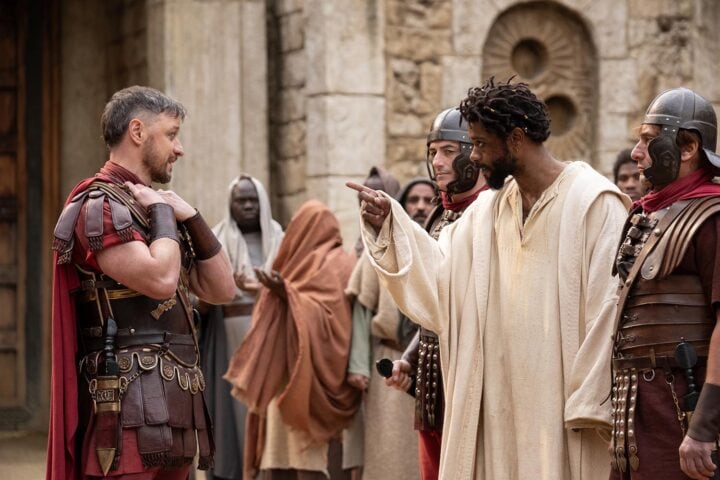Viewers took to social media to express their confusion and consternation after the first trailer for Mean Girls—the new film adaptation of the stage musical adaptation of the beloved 2004 film—dropped in November with no singing at all. Many wondered if this was just an ordinary remake for a new teen generation. After all, the tagline is “This is not your mother’s Mean Girls.” More than just aggrieved musical theater fans questioned whether producers were ashamed to let audiences know that this was indeed a movie musical.
The good news is that this Mean Girls proudly wears that genre like a homecoming crown, as the embrace of storytelling through song and dance is front and center. That was to be expected, as the musicalization of Mean Girls was largely a success back in 2018 when it opened on Broadway, and in large part because Tina Fey’s book for the stage was funnier than her original script. But, in the end, bringing the musical to the screen makes for a more uneasy homecoming.
While fundamentally entertaining, the film, directed by Samantha Payne and Arturo Perez Jr., often finds itself in distractingly constant conversation with its original source material. It’s as if the act of paying spot-lit homage to classic moments from the first Mean Girls (October 3rd! You go, Glen Coco! Her hair is full of secrets!) is as equally important as telling the central story of Cady Heron (Angourie Rice), a teen transplant from Kenya to Illinois, who tries to bring down the titular clique from the inside only to become a malicious Queen Bee herself.
At its best, when it leans full force into the heightened movie-musical landscape, this Mean Girls can feel audaciously reinventive. The mirthfully malevolent “Revenge Party,” sung by outcasts Janis (Auli’i Cravalho) and Damian (Jaquel Spivey), explodes into a chaotically colorful fantasy sequence. As the vicious Regina George (Reneé Rapp) seduces Aaron (Christopher Briney), “Someone Gets Hurt” plays out amid the frozen bodies of all the other partygoers, eerily lit and sometimes spasmodically trembling. During most songs, the camera curves around the actors, often spinning with dizzying speed and once even flipping upside-down.
But with a great deal of the musical’s best songs for defining and deepening characters cut for the film (including most of the introductory numbers for Cady, Damian, and the Plastics), there are also long stretches of scenes between songs that feel like a lightweight remake of the original Mean Girls. Most of the cast excels in song, but few of them match the exuberant specificity of the 2004 film’s actors; Spivey’s brassy Damian and Avantika’s marvelously ditzy Karen come the closest. (One member of the original young cast makes a late-breaking surprise cameo that’s both a lot of fun and a nostalgic reminder of the gifts of that 2004 lineup.) And if the musical sequences work overtime to justify this project’s existence as more than a carbon copy, the remainder of Payne and Perez Jr.’s film doesn’t do enough to make a case for itself.
But if this Mean Girls thrives too much on its relationship to the original, more tribute with songs than independent adaptation, its enjoyability is also a testament to the original’s staying power, as well as to Fey’s decades-long faith in the recyclability of her own material. And to be fair, Jeff Richmond and Nell Benjamin, the musical’s composer and lyricist team, have also penned a lively, smart score that’s responsible for all of the film’s most buoyant moments.
In interpreting three of those songs, Rapp, who played Regina on Broadway in the show’s final cast before catapulting to singer-songwriter success, is exquisitely wicked, making silly lyrics like “This girl is a fugly cow” sizzle in her magnetic croon. Carvalho (the voice of the title character in the Disney animated film Moana) animates Janis with righteously incendiary vocals. And while Rice, so haunting in Brad Ingelsby’s limited series Mare of Easttown, doesn’t really have the musical theater chops to pull off Cady’s emotional evolution, her convincing transformation from fish out of water to chief mean girl still comes as a nasty shock.
Fey has dotted her new screenplay with a refreshingly self-aware collection of gags that call attention to the musical genre by reframing the music-making as deliciously diegetic. As Janis, Damian, and Cady banter beneath a tree on their high school’s campus, the camera pans up to reveal that the dramatic underscoring is being provided by a quartet of band geeks perching with their instruments in the branches above. Required to issue an apology to a classmate who’s been hurt after a school-wide fight, one student apologizes for telling her friend she was dragging the tempo during “Revenge Party,” the musical fantasy sequence.
Reprising her role as Ms. Norbury, Fey also reserves the film’s funniest moment—a gleeful reference to the conventions of movie musicals that’s too silly to spoil here—for herself. After 20 years of trying to make fetch happen, it’s safe to say that she’s earned it.
Since 2001, we've brought you uncompromising, candid takes on the world of film, music, television, video games, theater, and more. Independently owned and operated publications like Slant have been hit hard in recent years, but we’re committed to keeping our content free and accessible—meaning no paywalls or fees.
If you like what we do, please consider subscribing to our Patreon or making a donation.




